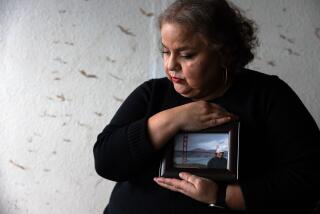A 2-year-old is on life support in Oakland. Trump’s travel ban could keep his Yemeni mother from saying goodbye
- Share via
The mother of a 2-year-old boy on life support in an Oakland hospital may not receive a travel ban waiver in time to say goodbye to her son, the Council on American-Islamic Relations said Monday.
At a news conference in Sacramento, members of CAIR, community activists and faith leaders stood alongside the boy’s father and demanded that the Trump administration expedite the woman’s application for a waiver.
The ban, they said, is “hateful and discriminatory.”
“My son Abdullah needs his mother,” Ali Hassan, 22, said. “My wife’s calling me every day, wanting to kiss and hold our son for one last time.”
Hassan’s voice cracked as he stood at the lectern. Through tears, he explained that his son just celebrated his birthday from a bed at UCSF Benioff Children’s Hospital.
Abdullah Hassan was born in Yemen and traveled to the United States with his father a few months ago to receive treatment for a degenerative brain disease. Both are American citizens, CAIR said.
But Abdullah’s mother, a Yemeni national currently living in Egypt, has not been able to obtain a visa to be with her son. Shaima Swileh has applied for a waiver, and multiple requests have been submitted to expedite the process, but her application is still pending, according to CAIR.
Doctors have said Abdullah’s body may not be able to withstand staying on life support much longer.
“Time’s running out. Please help us get our family together again,” Hassan said as his attorney wrapped an arm around him.
CAIR’s Sacramento Valley chapter said it planned to file a petition on Swileh’s behalf asking the courts to force the government to speed up its response to her request for a waiver.
“This is a very real case that really shows the effects of family separation,” said Saad Sweilem, a civil rights attorney with CAIR who is representing the family. “This is a United States citizen that is going to die away from his mother.”
A representative for the State Department said it made “every effort to facilitate legitimate travel by international visitors.”
“We are also fully committed to administering U.S. immigration law and ensuring the integrity and security of our country’s borders,” the representative said in an email.
The administration has been forced to revise the original travel ban order twice since it was first rolled out in January 2017 to resolve legal problems over due process, implementation and exclusive targeting of Muslim nations.
In June, the Supreme Court upheld the ban. The current version covers five Muslim-majority nations — Iran, Libya, Somalia, Syria and Yemen — as well as North Korea and some government officials from Venezuela.
Visa waiver applications are decided on a case-by-case basis, according to the State Department. There are three criteria outlined in the proclamation for a waiver: that denying entry would cause the applicant hardship; entry would not pose a threat to the national security or public safety of the U.S.; and entry would be in the national interest.
Sweilem said the war in Yemen pushed the family to try to move to the U.S. The conflict has thrust the country into what the United Nations says is the world’s worst humanitarian disaster, with millions of people on the brink of starvation.
And because of the war, there is no U.S. embassy, Sweilem said. So when Hassan and his wife realized Abdullah needed better care than what was available in Yemen, they had to travel to Cairo where Hassan could petition for Swileh to receive a visa. The request was denied.
In October, they applied for a waiver. Hassan flew to California with his son while Swileh waited to hear back.
“When Abdullah left his mother’s arms a few months ago, she never thought to give him a final farewell,” Sweilem said. “They are really trying to grieve together as a family. If this case isn’t one that qualifies for a waiver, then you have to ask what case is.”
For more California news follow me on Twitter: @sarahparvini
More to Read
Sign up for Essential California
The most important California stories and recommendations in your inbox every morning.
You may occasionally receive promotional content from the Los Angeles Times.











